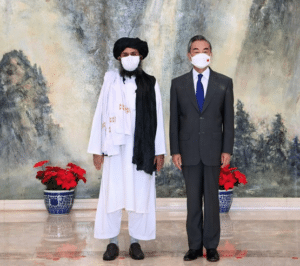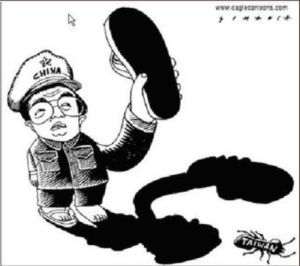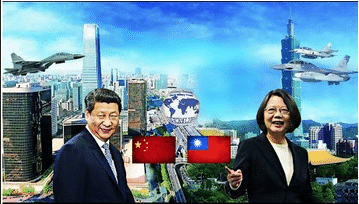 China has been leading the chorus of authoritarian countries expressing unbridled schadenfreude over America’s humiliating and tragic retreat from Afghanistan. Its official state news agency, Xinhua, set the tone with an August 16 headline that read:
China has been leading the chorus of authoritarian countries expressing unbridled schadenfreude over America’s humiliating and tragic retreat from Afghanistan. Its official state news agency, Xinhua, set the tone with an August 16 headline that read:
The ‘fall of Kabul’ rings the funeral bell of US hegemony
But its unofficial state newspaper, the Global Times, reflected what Chinese officials are really thinking. In an editorial the next day, it gloated about America abandoning Afghanistan and teased Taiwan about facing a similar fate.
Here is an excerpt from that editorial, which it published under the headline “Taliban’s rapid victory embarrasses US, smashes image, arrogance”:
_________
How Washington abandoned the Kabul regime particularly shocked some in Asia, including the island of Taiwan. … Is this some kind of omen of Taiwan’s future fate?
From what happened in Afghanistan, they should perceive that once a war breaks out in the Straits, the island’s defense will collapse in hours and the US military won’t come to help. As a result, the DPP authorities will quickly surrender, while some high-level officials may flee by plane.
The best choice for the DPP authorities is to avoid pushing the situation to that position. … They should keep cross-Straits peace with political means, rather than acting as strategic pawns of the US and bear the bitter fruits of a war.
_________
To be sure, everyone was shocked and dismayed by the debacle that just played out in Afghanistan. But some of us did not need that to warn Taiwan about the perilous and tenuous nature of its alliance with the United States.
Here in part is how I commented on the Damoclean threat China posed over 15 years ago in “China vs. Taiwan (and the United States): Nuclear Friction in the Taiwan Strait,” July 19, 2005:
________
China regards Taiwan as a renegade province. And no country (including the United States) has ever denied China’s territorial claims over this self-governing island.
Yet successive Taiwanese governments have declared their preference for official independence from China. They have been emboldened in this pyrrhic quest by America’s Taiwan Relations Act 1979 – under which the United States has been arming Taiwan to help
… maintain the capacity of the United States [pursuant to its 1954 pledge] to resist any resort to force or other forms of coercion [by China] that would jeopardize the security, or the social or economic system, of the people on Taiwan.
 But, significantly, the United States has stopped far short of supporting Taiwan’s drive for independence. In fact, it has endorsed China’s claim by cutting diplomatic ties with Taiwan in order to recognize only ‘one China and that Taiwan is part of China.’ Therefore, for all these years, peace and stability across the Taiwan Strait have been predicated on China’s commitment to
But, significantly, the United States has stopped far short of supporting Taiwan’s drive for independence. In fact, it has endorsed China’s claim by cutting diplomatic ties with Taiwan in order to recognize only ‘one China and that Taiwan is part of China.’ Therefore, for all these years, peace and stability across the Taiwan Strait have been predicated on China’s commitment to
… firmly abide by the principles of peaceful re-unification of one country two systems.
In recent years, however, China’s meteoric rise as a global economic power has allowed it to finance a military build-up that threatens to destabilize the uneasy détente in this trilateral relationship. And last March, in a foreboding gesture, its legislature passed an Anti-Secession law that grants China’s leaders legal cover to order its military to use any means necessary (including preemptive strikes) to prevent Taiwan from becoming an independent nation. …
If China invades, American security guarantees would probably prove as helpful to Taiwan as British and French guarantees proved to Poland when Germany invaded in 1939. Indeed, in that event, the United States would probably only issue a diplomatic reprimand and, perhaps, call for economic sanctions against China. What is certain, however, is that the United States will not engage China in a war over Taiwan; and China knows it!
Therefore, Taiwan seems fated to fall under China’s direct control. The only question is whether China will remain patient enough to accomplish its objective by political proxy (using Taiwan’s Opposition Party – the Kuomintang); or whether China will finally exercise its military might and take the island by force.
________
I’ve been sounding this alarm repeatedly ever since, including most recently in “China Lays (Political) Claim to Taiwan,” January 3, 2019, and “China vs. USA Over Taiwan: Militaries Maneuvering, Tensions Rising, but No Shots Firing,’ February 1, 2021.
That said, Taiwan is no Afghanistan. This is why I have also warned China that attempting to take Taiwan by force would be tantamount to America fighting the Vietnam War on the island of Cuba. After all, the United States has been arming and training Taiwan’s far more capable, cohesive, and committed military for years.

Therefore, China has to consider the cost of having a Vietnam-like conflict on its own doorstep. Because there’s no chance in hell this army is going to fold like a cheap suit for it to take over the way the Afghan army did for the Taliban. In other words, China would be willfully launching a war in its own backyard that will prove every bit as pyrrhic as America’s war in Afghanistan has proven, at best.
Meanwhile, China is not forming any enduring alliances by continuing its bull-in-a-china-shop style of diplomacy. Only that explains it announcing on Sunday that, effective September 1, it will be enforcing Taliban-like checkpoints in the South China Sea. This will require all military and commercial vessels “to report their information” when passing through – ostensibly to ensure they pose no threat.
Of course, the only threat afoot is the one these checkpoints pose to the over $5 trillion in trade that passes through the South China Sea. Not to mention the extraterritorial aggression it portends against regional countries like Indonesia and Vietnam that have laid their own territorial claims to these waters.
As is its won’t, China will bully some countries into compliance. But I’m sure the United States and other major powers and shippers like India will sail right through the South China Sea as before.
Related commentaries:
Taiwan… Afghanistan evacuation…